QuestionBecky,
I have a five month old terrier/chihuahua mix(1/2 chihuahua + 1/2 terrier) from my neighbors. I'm not sure what kind of terrier she has in her but I'm pretty sure it was a mix. My puppy is absolutely adorable! She looks more like a terrier thatn a chihuahua. She has a yorkie face, yorkie coloring and big chihuahua ears. She is a small dog. She's full of love and energy. I have two older kittens I rescued that she romps and plays with all the time. What I'm worried about is her fur and keeping her warm during this Indiana winter (she is a house dog). She has a golden downy layer about 3/4" long that lays next to her body. Then very thin, very sparse, very whispy longer brown and black terrier looking fur that's about 2 inches long that comes out of the downy layer. I would appreciate any advice you have on how to keep her warm. I would also appreciate any advice you might have on potty training. She's very smart, knows where to potty, has pads in several rooms, but uses them only when she feels like it, and only uses them for urinating. She preferes the carpet for the other. :) I'd also appreciate any advice or helpful information on behavior I might expect, general care, etc. Thanks so much!
AnswerHi Rhonda,
Sounds like you have a little cutie there!
You need to get her a sweater. Walmart sells them. Let her go out to use the potty then take her back in. She doesn't need to spend that much time outside. If it snows, be sure to clear an area that she can easily get to.
I have found a website that has very good instructions on housebreaking. I have copied it for you here, but if you want the url is is: http://www.dog-breeds.net/
There is a book at this site that you can buy if you are interested.
PUPPY HOUSEBREAKING TIPS
Puppy housebreaking can be accomplished by many different methods. Keep in mind that puppies are unable to fully control their bowels until they are a few months old. You will have some success during the early months; however, you should expect a few accidents. To avoid difficult clean-ups, keep puppies supervised at all times until you are certain that your pup is housebroken. Once you allow your pup to urinate in the house, he is likely to return to the same spot the next time he has to relieve himself.
Your puppy should be let outside to potty just before you retire for the night. Likewise, as soon as he wakes up in the morning, the first thing your pup will need to do is relieve himself. You should waste no time in taking him outside as soon as he awakes. When your pup hears you get up in the morning, it will be his signal to wake, so attend to him before going about your morning routine. Some pups may cry that they need to go outside at the first sign of light, and if you want a dry floor, it is usually necessary to immediately respond to their needs.
Your pup will also have to relieve himself shortly after a meal, and will need to urinate more often during the summer when his water intake is higher. As soon as your pup finishes dinner, place him outside for several minutes until he potties. At other times, you may notice your pup sniffing the floor for a suitable place to relieve himself. He may whimper or start to squat. Scoop him up immediately and place him outside.
Puppy Housebreaking may be quickened if your pup sleeps in his crate. Dogs dislike sleeping in a soiled area, and your pup will soon learn to wait until you let him out of his crate to do his business. Of course, it may take a few months before your pup is able to hold his bowels all night. As he gets older, he will have fewer and fewer accidents. Expect this, and never scold him for accidentally soiling his area at night.
If your puppy does have an accident during the day, only scold him if you catch him in the act. If you scold him even a minute or two after he has pottied, it will confuse him because he will not know why he is being scolded. If, however, you catch him in the act of relieving himself in the house, pick him up and say "No" in a firm voice. Do not yell at the pup. Immediately take him to the outside area where you want him to potty. Never rub his nose in the mess or hit him; this will cause him to fear you and will make future obedience training more difficult. Be sure to clean the soiled area with a product intended for housebreaking accidents. It should be formulated to remove both the stain and the odor so your pup will not be tempted to soil the same spot.
These training tips apply both to puppies and older dogs. For older puppies and dogs that continue to wet in the house, we recommend belly bands, which absorb wetness and prevent staining on carpets and furniture. click here
Housebreaking pads help to quickly housebreak pups. These pads are scented with attractants, and will encourage your pup to eliminate on the pad and not on your carpet. For the first few weeks, when you cannot watch your pup in the house, confine him to an area with an easy-to-clean flooring such as a kitchen. Place the pad on the floor. Your pup will learn to relieve himself on the specially scented pad. Eventually, you can move the pad closer and closer to the back door, and then place the pad outside. Once your pup learns to use the outdoors to relieve himself, you will no longer need to use the pads.
Remember, you are the greatest aid to your puppy's success. Be consistent and available to his needs. With your consistency, soon your pup will become completely trained.
Puppy Housebreaking Problems
Some common issues and what to do.
Tips below courtesy of Bobbi Owaster
VOM HAUS DRAGE KENNEL & PET RESORT http://pets4you.com/pages/vomhaus.html
When your pup says, "I am NOT going to go potty now!"
1. Be very patient. Do not let the pup talk you into playing.
2. Try to go to the same area, leave a scent pad for reminder.
3. Be very quiet. DO NOT distract the pup from his purpose.
4. Confine the pup in small area until outside success is achieved.
5. Use another dog to prompt pup. Remember - no playing.
But I want to eat my feces!
1. Brought on by example, influenced by the desire to be clean.
2. Usually occurs when pup has been bored, alone, or confined.
3. Use a product called Forbid.
4. Can be hormonally triggered in females.
Diarrhea causes difficulty in housetraining!
1. Remember when you couldn't hold it?
2. Try to be patient as loose bowels create the need to go often.
3. Could be caused by worms (even microscopic).
4. If worms are present have your veterinarian de-worm, or use an over-the-counter wormer, following directions carefully.
5. Could even be caused by the food you eat and share.
6. Ask your vet about dosage before treating with Pepto Bismol, Imodium AD or other binder.
7. If there is blood in the stool, contact your veterinarian right away.
I might add that you need to make sure she gets her shots, is dewormed and be sure to put her on a heartworm prevention. If you put her on that before she turns 6 mos old, you won't have to get her blood tested.
Good luck and God Bless!
Becky

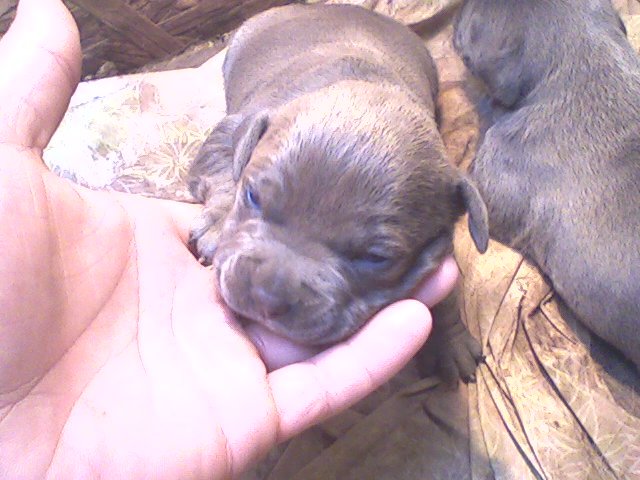 Puppy help? does this look like a nice quality puppy?
Question
3 weeks old
im getting this blue nose puppy so
Puppy help? does this look like a nice quality puppy?
Question
3 weeks old
im getting this blue nose puppy so
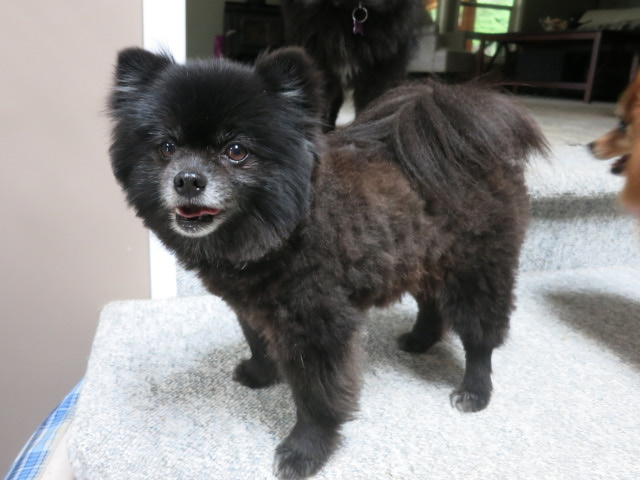 Will my Pomeranian loose his hair
Question
My Pomeranian`s hair c
I have a 5 year
Will my Pomeranian loose his hair
Question
My Pomeranian`s hair c
I have a 5 year
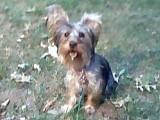 3yr. old Yorkie with ? OCD behavior
Question
Keelee
We live in S.Central WI & with the chan
3yr. old Yorkie with ? OCD behavior
Question
Keelee
We live in S.Central WI & with the chan
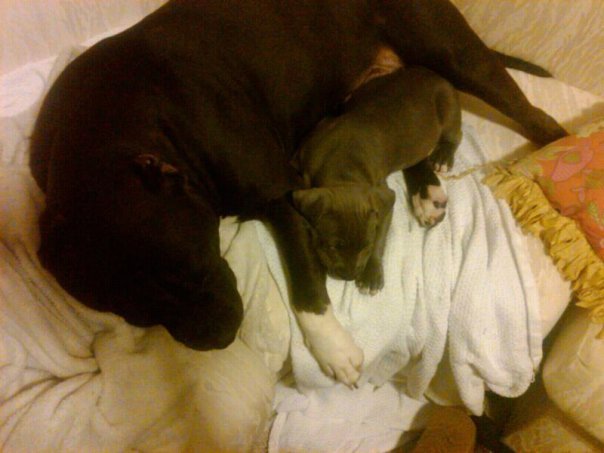 Dog aggression towards puppy
Question
The father and his pup
My older dog is an Amer
Dog aggression towards puppy
Question
The father and his pup
My older dog is an Amer
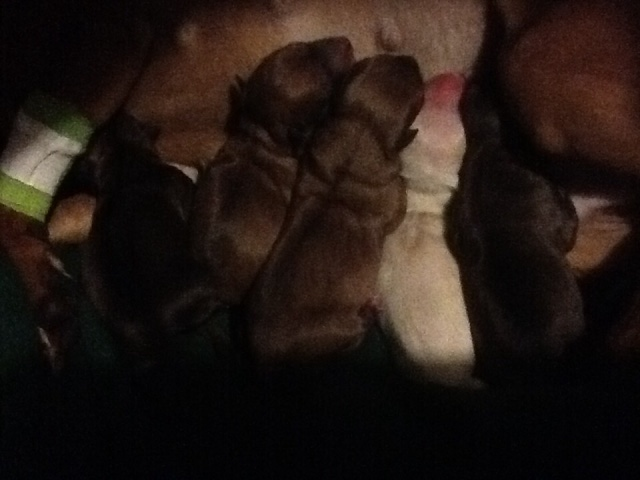 Temperature before birth
QuestionQUESTION: My female cheweenie is on day 52 of h
Temperature before birth
QuestionQUESTION: My female cheweenie is on day 52 of h